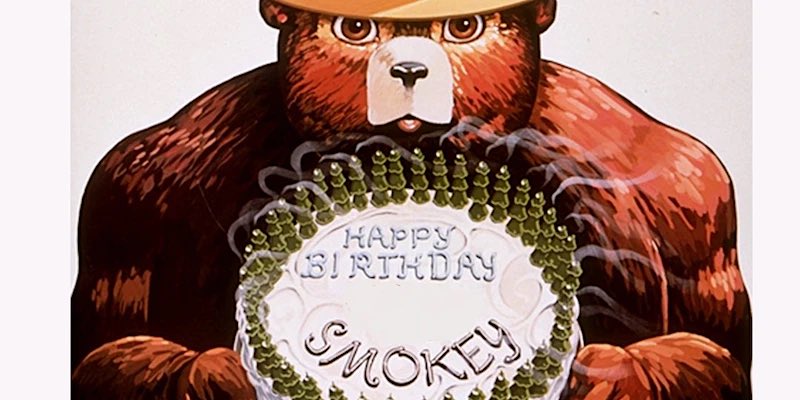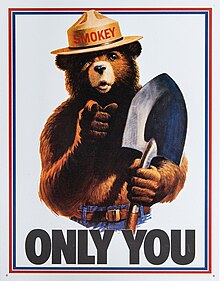Welcome to DU!
The truly grassroots left-of-center political community where regular people, not algorithms, drive the discussions and set the standards.
Join the community:
Create a free account
Support DU (and get rid of ads!):
Become a Star Member
Latest Breaking News
Editorials & Other Articles
General Discussion
The DU Lounge
All Forums
Issue Forums
Culture Forums
Alliance Forums
Region Forums
Support Forums
Help & Search
American History
Related: About this forumOn this day, August 9, 1944, Smokey Bear was "born," or introduced, or whatever.
Fired via email? Bambi.
https://en.wikipedia.org/wiki/Main_Page
• 1944 – The United States Forest Service authorized the use of Smokey Bear (pictured) as its mascot to replace Bambi.

First Smokey Bear poster

First Smokey Bear poster
Smokey Bear Retweeted
Tomorrow is our pal
@smokey_bear
’s 78th birthday! {in 2022} Join us for a virtual birthday party to celebrate & commemorate the importance of his message—Only you can prevent wildfires! Join the party: http://facebook.com/smokeybear @ 12:00 PM PDT
@smokey_bear
’s 78th birthday! {in 2022} Join us for a virtual birthday party to celebrate & commemorate the importance of his message—Only you can prevent wildfires! Join the party: http://facebook.com/smokeybear @ 12:00 PM PDT
Link to tweet

Smokey Bear

Smokey Bear in a poster based on the
"Uncle Sam/Lord Kitchener Wants You"
poster
First appearance: 1944
Created by: Advertising Council
Born: Spring, 1950; Capitan, New Mexico
Smokey Bear is an American advertising icon created by the U.S. Forest Service with artist Albert Staehle, possibly in collaboration with writer and art critic Harold Rosenberg. In the longest-running public service advertising campaign in United States history, the Ad Council, the United States Forest Service (USFS), and the National Association of State Foresters (NASF) employ Smokey Bear to educate the public about the dangers of unplanned human-caused wildfires.
Campaign beginnings

Smokey Bear's debut poster.
Art by Albert Staehle
Although the U.S. Forest Service fought wildfires long before World War II, the war brought a new importance and urgency to the effort. At the time, most able-bodied men were already serving in the armed forces and none could be spared to fight forest fires. The Forest Service began using colorful posters to educate Americans about the dangers of forest fires in the hope that local communities, with the most accurate information, could prevent them from starting in the first place.
On August 13, 1942, Disney's fifth full-length animated motion picture Bambi premiered in New York City. Soon after, Walt Disney allowed his characters to appear in fire prevention public service campaigns. However, Bambi was only loaned to the government for a year, so a new symbol was needed. After much discussion, a bear was chosen. His name was inspired by "Smokey" Joe Martin, a New York City Fire Department hero who suffered burns and blindness during a bold 1922 rescue.
Smokey's debut poster was released on August 9, 1944, which is considered the character's birthday. Overseen by the Cooperative Forest Fire Prevention Campaign (CFFP), the first poster was illustrated by Albert Staehle. In it Smokey was depicted wearing jeans and a campaign hat, pouring a bucket of water on a campfire. The message underneath reads, "Smokey says – Care will prevent 9 out of 10 forest fires!" Knickerbocker Bears gained the license to produce Smokey Bear dolls in 1944. Also in 1949, Forest Service worker Rudy Wendelin became the full-time campaign artist and he was considered Smokey Bear's "manager" until Wendelin retired in 1973.
{snip}

Smokey Bear in a poster based on the
"Uncle Sam/Lord Kitchener Wants You"
poster
First appearance: 1944
Created by: Advertising Council
Born: Spring, 1950; Capitan, New Mexico
Smokey Bear is an American advertising icon created by the U.S. Forest Service with artist Albert Staehle, possibly in collaboration with writer and art critic Harold Rosenberg. In the longest-running public service advertising campaign in United States history, the Ad Council, the United States Forest Service (USFS), and the National Association of State Foresters (NASF) employ Smokey Bear to educate the public about the dangers of unplanned human-caused wildfires.
Campaign beginnings

Smokey Bear's debut poster.
Art by Albert Staehle
Although the U.S. Forest Service fought wildfires long before World War II, the war brought a new importance and urgency to the effort. At the time, most able-bodied men were already serving in the armed forces and none could be spared to fight forest fires. The Forest Service began using colorful posters to educate Americans about the dangers of forest fires in the hope that local communities, with the most accurate information, could prevent them from starting in the first place.
On August 13, 1942, Disney's fifth full-length animated motion picture Bambi premiered in New York City. Soon after, Walt Disney allowed his characters to appear in fire prevention public service campaigns. However, Bambi was only loaned to the government for a year, so a new symbol was needed. After much discussion, a bear was chosen. His name was inspired by "Smokey" Joe Martin, a New York City Fire Department hero who suffered burns and blindness during a bold 1922 rescue.
Smokey's debut poster was released on August 9, 1944, which is considered the character's birthday. Overseen by the Cooperative Forest Fire Prevention Campaign (CFFP), the first poster was illustrated by Albert Staehle. In it Smokey was depicted wearing jeans and a campaign hat, pouring a bucket of water on a campfire. The message underneath reads, "Smokey says – Care will prevent 9 out of 10 forest fires!" Knickerbocker Bears gained the license to produce Smokey Bear dolls in 1944. Also in 1949, Forest Service worker Rudy Wendelin became the full-time campaign artist and he was considered Smokey Bear's "manager" until Wendelin retired in 1973.
{snip}
About that hat:
Campaign hat
(Redirected from Smokey Bear hat)
A campaign hat is a broad-brimmed felt or straw hat, with a high crown, pinched symmetrically at the four corners (Montana crown).
The hat is most commonly worn as part of a uniform, by such agencies as the Royal Canadian Mounted Police, the New Zealand Army, United States Park Rangers, and Scouts.
The campaign hat is occasionally referred to as a Stetson, derived from its origin in the company's Boss of the Plains model in the late 19th century. It should not be confused with the Stetson style cowboy hat, which has a different brim and crease, nor a slouch hat.
{snip}
Current usage
{snip}
United States
{snip}
Park rangers

Smokey Bear wears a forest ranger
style campaign hat
Campaign hats are worn by US park rangers of the National Park Service. The federal troops sent to protect the resources of the first national parks were cavalry troopers, whose campaign hat was adopted by the Park Service as a symbol of authority.
The evolution of the campaign hat can be seen in a 1905 photo of Buffalo Soldiers in Yosemite. Although the hat would not become Army standard until six years later, some in the photo have re-creased their hats into the Montana Peak, probably during their service in Cuba or the Philippines during the 1898 Spanish–American War.
Following the national park ranger style, many states' fish and game wardens and state park police wear campaign hats. Rangers of many local parks departments also wear the campaign hat, such as the New York City Urban Park Rangers.
The animal logo-mascot of the US Forest Service, Smokey Bear, wears the campaign hat. Smokey's debut poster was released on August 9, 1944, which is considered his birthday. Overseen by the Cooperative Forest Fire Prevention Campaign, the first poster was illustrated by Albert Staehle. In it, Smokey was depicted wearing jeans and a "forest ranger's hat" (a campaign hat), pouring a bucket of water on a campfire. The message underneath reads, "Smokey says – Care will prevent 9 out of 10 forest fires!"
The emblem of the National Park Foundation was, until December 2013, a stylized campaign hat.
{snip}
(Redirected from Smokey Bear hat)
A campaign hat is a broad-brimmed felt or straw hat, with a high crown, pinched symmetrically at the four corners (Montana crown).
The hat is most commonly worn as part of a uniform, by such agencies as the Royal Canadian Mounted Police, the New Zealand Army, United States Park Rangers, and Scouts.
The campaign hat is occasionally referred to as a Stetson, derived from its origin in the company's Boss of the Plains model in the late 19th century. It should not be confused with the Stetson style cowboy hat, which has a different brim and crease, nor a slouch hat.
{snip}
Current usage
{snip}
United States
{snip}
Park rangers

Smokey Bear wears a forest ranger
style campaign hat
Campaign hats are worn by US park rangers of the National Park Service. The federal troops sent to protect the resources of the first national parks were cavalry troopers, whose campaign hat was adopted by the Park Service as a symbol of authority.
The evolution of the campaign hat can be seen in a 1905 photo of Buffalo Soldiers in Yosemite. Although the hat would not become Army standard until six years later, some in the photo have re-creased their hats into the Montana Peak, probably during their service in Cuba or the Philippines during the 1898 Spanish–American War.
Following the national park ranger style, many states' fish and game wardens and state park police wear campaign hats. Rangers of many local parks departments also wear the campaign hat, such as the New York City Urban Park Rangers.
The animal logo-mascot of the US Forest Service, Smokey Bear, wears the campaign hat. Smokey's debut poster was released on August 9, 1944, which is considered his birthday. Overseen by the Cooperative Forest Fire Prevention Campaign, the first poster was illustrated by Albert Staehle. In it, Smokey was depicted wearing jeans and a "forest ranger's hat" (a campaign hat), pouring a bucket of water on a campfire. The message underneath reads, "Smokey says – Care will prevent 9 out of 10 forest fires!"
The emblem of the National Park Foundation was, until December 2013, a stylized campaign hat.
{snip}
A lot of these video links have gone bad.
Take it away, Smokey:
Whoops! Wrong Smokey. This is so embarrassing.
Try this: Eddy Arnold, reminiscent of the opening of "My Own Private Idaho." Would it have killed them to have gone to a real forest to film this?
I know; I know. He's Smokey Bear, not "Smokey the Bear." You make the song work without the "the."
The Ballad of Smokey the Bear (1966), narrated by James Cagney:
"Nonbreakable with normal use" {edited, 08-09-2019: had been this:
Holly Peek
Published on Sep 6, 2017
Published on Sep 6, 2017
Oooooh, Gene Autry. I wish I could find a video of this:
For no other reason than "it's outdoorsy," here's Ranger Hal:
Some ads work better than others:
Finally, no good deed goes unpunished. Smokey Bear is an elitist plot to make you accept Agenda 21. You knew this had to happen:
Wed Aug 9, 2023: On this day, August 9, 1944, Smokey Bear was "born," or introduced, or whatever.
Tue Aug 9, 2022: On this day, August 9, 1944, Smokey Bear was "born," or introduced, or whatever.
Mon Aug 9, 2021: Happy 77th birthday, Smokey Bear!
Thu Aug 9, 2018: Why do they call him Smokey? And how did he get his name? 74 years old today, Smokey Bear.
1 replies
 = new reply since forum marked as read
Highlight:
NoneDon't highlight anything
5 newestHighlight 5 most recent replies
= new reply since forum marked as read
Highlight:
NoneDon't highlight anything
5 newestHighlight 5 most recent replies
On this day, August 9, 1944, Smokey Bear was "born," or introduced, or whatever. (Original Post)
mahatmakanejeeves
Aug 2024
OP
EYESORE 9001
(29,479 posts)1. I remember the story in comic book format as a child in the early '60s
It had a profound effect on my young psyche. Seems I’ve been putting out fires ever since - literally and figuratively.